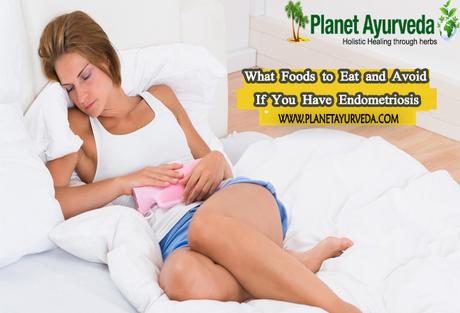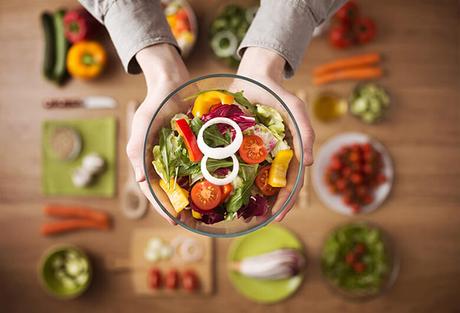
What is Endometriosis?
As per Modern Aspect:
It is a painful disorder in which the inner tissue lining of the uterus called endometrium grows outside the uterus.
It usually involves fallopian tubes, ovaries and the tissue lining the pelvis.
When there is an involvement of ovaries, cysts called endometriomas may form. There is an irritation in the surrounding tissues that eventually develop scars and adhesions. Endometriosis can cause pain; sometimes it is very severe, especially during periods. Chances of infertility may also develop. It includes many symptoms like painful urination, pain during intercourse, excessive bleeding, constipation/ diarrhea, and fatigue.
As per Ayurveda concept:
In Ayurveda, we can relate it with Yonivyapat.
Yonivyapat By Charaka:
- Arajaskayoni (Amenorrhea)
- Putraghni (Bad Obstetric history)
- Udavartayoni (Dysmenorrhea)
- Suchimukhi ( Atrophy of Uterus-congenital anomaly)
- Vamini (Small uterus that expels the sperm and ovum along with menstrual waste)
- Mahayoni (Prolapse of the uterus)
- Shandi (Sterility)
Yonivyapat By Sushruta:
- Udavartini (Dysmenorrhea)
- Vivrta (Abnormal vaginal tract)
- Paripluta (STDs with severe pain during intercourse)
- Bandhya (Inherent Infertility)
- Putraghani (Bad obstetric history)
- Vamini, vivrta (wide or abnormal vaginal tract) and shandi
Pradara (abnormal Bleeding)
This can also result in infertility.
According to Ayurveda, the doshas lose their capacity to function properly. This abnormal functioning of Vata dosha can be a causal factor in endometriosis. Another factor can be a fundamental problem with low Ojas.
What foods to eat in Endometriosis?
Plenty of vegetables, fruits, and whole grains:
Fruits, vegetables and whole grains are especially important for those who are suffering from endometriosis because these are rich in vitamins, minerals, and fiber.
- Fiber intake may benefit digestion and reduces the risk of chronic disease. Intake of high fiber diet may lower the estrogen level by binding them to waste carrying bile and removes them through the digestive tract.
- Some fruits that contain insoluble fibers include apples, plums, pomegranates, and citrus fruits.
- Fruits and vegetables are the best sources of fiber diet and both have an antioxidant property that combats the inflammation.
- Vegetables have both anti-oxidant as well as anti-inflammatory properties and are rich in vitamins A, C, and E.
It includes:
- Carrots
- Brussels
- Cauliflower
- Peas
- Sprouts and other green leafy vegetables.
- Omega-3 fats:
Omega-3 fats are the building blocks of the body that provides relief in pain and inflammation because they have an anti-inflammatory property that can be found in fatty fish. Many fish oil supplements that contain omega-3 fats significantly decrease menstrual symptoms as well as pain.
Gluten-Free Diet:
A gluten-free diet should be given in endometriosis because it helps in a reduction in pelvic pain, painful menstruation and other symptoms of endometriosis.
It includes:
Certain foods may help in the breakdown of estrogen and remove the toxins from the body. Intake of cruciferous vegetables helps in providing relief from the symptoms of endometriosis.
It includes:
Anti-inflammatory herbs:
Certain herbs such as ginger and turmeric have an anti-inflammatory property that reduces the uterine inflammation and other symptoms and provides relief to the patient.
Nuts and seeds:
Nuts and seeds are excellent sources of vitamin B complex and high in omega-3s, which are good for those with endometriosis and provides relief.
Many nuts such as Brazil nuts contain high amounts of selenium, which helps the body to fight against abnormal cell formation by its anti-oxidant property.
Walnuts:
Like almonds, it also contains omega-3 fats and consumption of these nuts will help in increasing fatty acids and helps in balancing the omega 3 to omega 6 ratio.

What foods to avoid in Endometriosis?
Avoid dairy products:
Avoid dairy products because of its dioxin content and naturally occurring hormones in it. It should definitely be organic with no addition of hormones.
Alcohol:
Alcohol is an inflammatory agent that impairs the ovarian function and affects fertility. It depletes vitamin B complex and increases the load on the liver which is responsible for detoxifying the body from toxins, chemicals. Females with endometriosis should reduce their caffeine and alcohol intake. This helps in alleviating the symptoms such as painful menstruation, uterine irritation, etc.
Soy Products:
Avoid the intake of soy foods because they are estrogenic and an increase in estrogen results in the thickening of the uterus that triggers endometriosis growth.
Non-organic foods:
Non-organic foods contain pesticides, hormones, fertilizers and toxins that can interfere with normal regulation of hormones.
Unhealthy Oils: :
These unhealthy oils increase the 'bad' cholesterol and increase the risk of heart disease. These are found in foods such as commercially prepared baked goods, corn chips, vegetable oil shortening, microwave popcorn, etc. To eliminate the intake of trans fat, hydrogenated oils and highly refined omega 6 vegetable oils such as corn, safflower, cottonseed etc.
Caffeine:
Intake of an excess of caffeine alleviates the symptoms in some females and increases pain and inflammation symptoms and upsets the digestive system. It increases the production of estrogen levels in the body that encourages the development of endometriosis, causes chronic pain and other problems.
Avoid red meat:
Women who eat red meat are likely to have endometriosis because red meat contains dioxin that affects the levels of hormones. Beef, steak, pork, and veal should be avoided.
Avoid sweets (sugar) and refined flour:
Sugar has an inflammatory action and white foods such as white flour; has a high glycemic index. High Glycemic index means when the body rapidly converts white carbs into glucose in the bloodstream. To reduce the intake of sugars as much as possible.
Which therapies that can help in the management of endometriosis?
Exercise can help in the management of endometriosis by reducing the estrogen levels and release good hormones. Many other therapies can help in reducing the symptoms of endometriosis such as Yoga, meditation, and acupuncture that help in reducing stress and encourage relaxation.
Conclusion:
Endometriosis is an inflammatory pelvic condition that occurs in women who menstruate abnormally, which is caused by the presence of inflammatory endometrial tissues that are located outside the uterus and also involves fallopian tubes and ovaries. Foods that you should avoid and foods that you should eat are mentioned above. Therapies have also mentioned that help in reducing the symptoms regarding endometriosis.
Hope this information is useful.
